As far as I’m concerned, for the last few years indie developers have been leading the way with regards to music, and in certain instances, sound design in videogames. This is one of those instances. World of Goo, Braid, Frozen Synapse, SpaceChem, Bastion, Deepak Fights Robots, Fotonica, Every Day Shooter, VVVVVV, Jamestown, and I’m told Superbrothers: Sword & Sworcery EP: they all sound fantastic and Vessel is no exception. Vessel shares its title with a track by Jon Hopkins, the electronic ambient artist and producer responsible for the game’s soundtrack. Most of the music was originally released some years ago (as far back as 2005 I believe) but the two go together as if they were always meant to be. Much like Hopkins’ music, which blends traditional instrumentation and organic forms with electronic thuds and syncopated beats, in Vessel there’s this synthesis between the natural and the artificial; mechanical devices called ‘seeds’, liquid forming to develop these amorphous seemingly organic automatons, which, while intended for industry, are clearly evolving beyond their original design. And this is to mention nothing of the story’s resolution. Anyway, all these elements mesh together very nicely indeed. Look and listen:
As good as Hopkins’ music is however (and I fully intend to purchase his albums after this), credit should also be given to Leonard Paul who devised the games excellent sound engine. Unlike many games where the music patters along in the background independently, Vessel‘s changes dynamically depending on your actions and what’s going on on-screen. For example, while you’re working through a puzzle, Hopkins’ music will be gentle and ‘hollowed’ out, but as you slot together various parts of the solution, the percussion, bass and other layers start creeping in giving you a gradual lift as you progress. It’s subtle but effective, and creates a nice synergy between you and your actions.
I’m not sure how long it took me to complete Vessel (I played Steam-free), but the developers estimate a good ten hours of solid play which sounds about right to me. Perhaps Vessel’s biggest problem is that I enjoyed it so much I was left wanting more in spite of its strong finale. Oh god, do I want more. Strange Loop have done an exemplary job of exploring the possibilities of the mechanics they’ve laid down but I can’t help but feel there’s even more magic to be gleaned from them. If there was any game that deserved a level editor or a sequel or DLC, Vessel would get my vote hands down… or hands up, or whatever.
Anyway, Vessel is unique, as mesmerising to look at as it is to hear, brimming with smart mechanics and puzzles, and just a joy from start to finish. And after a two year wait since that first trailer, I couldn’t be more relieved to say all that. For $15 (less than £10), it gets my heartiest recommendation. If you’re still on the fence, there’s also a demo available on Steam which will hopefully push you off the right side of it.
Developer: Strange Loop Games | Publisher: IndiePub | Released: March 2012
Available on PC, planned versions for PS3 and Xbox 360
Email the author of this patent nonsense at greggb@tap-repeatedly.com



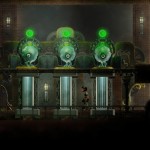
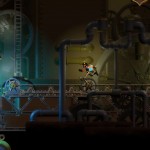
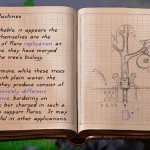
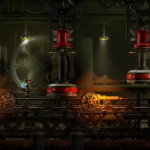


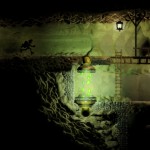
Looks interesting Geggis. The trailers make it look like there are some tricky and potentially timing based puzzles. Does it avoid becoming a chore to play?
This looks really interesting. Man, those videos – between the music and liquid effects – who says that parallax 2D is dead?
Great one, thanks Gregg.
@Helmut: it depends what you consider a chore really. There are a few timing based puzzles yes, but overall there’s a nice blend. I found it challenging throughout without ever feeling unfair or burdensome.
Edit: just watching the video back to jog my memory, most of the puzzles involving timing are fairly straightforward providing you have a plan and have all your Fluros in place and ready to go. I had a lot of fun setting up these solutions and hoping that I could execute them properly. If I remember rightly though, there are few puzzles, if any at all, that involve numerous successive timed elements.
Something along the lines of the game having enough learnable material to keep it fresh and interesting. SpaceChem, for all it’s wicked design and neat mechanics, consistently turns you around (after having spent 4 or more hours on the last problem) and feeds you a bigger harder problem. Hardly the reward you were looking for. The graphics of the fluids in Vessel look really intriguing, but does it stay fun and interesting all (or even most) of the way through?
I’d say so yes. Each area introduces at least a single new Fluro and liquid meaning the puzzles (that revolve around these things) are never quite the same. As you progress, each chapter within an area puts a slightly different spin on the new mechanics. The challenge doesn’t come from old mechanics being stacked on top of each other puzzle after puzzle until you’ve got some sort of stewed spaghetti to untangle (which I kind of get the impression SpaceChem does despite its tight design and mechanics), it comes from new mechanics requiring new ways of thinking. Kind of like Braid and World of Goo.
Edit: actually, that’s probably why I stuck with Vessel, Braid and World of Goo; the mechanics were refreshed enough to sustain my interest, whereas SpaceChem doesn’t really seem to do that, it seems to layer them up increasing each puzzle’s complexity as well as difficulty.
Edit2: To put it another way: unlike SpaceChem, Vessel is probably more about mental agility rather than mental strength and endurance.
[…] Gregg B on Vessel […]